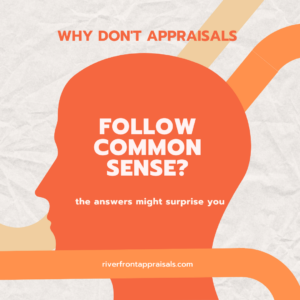
Property Taxes Just Went Up? We’ve Got You Covered!
It’s reassessment season for most folks in our area. Homeowners

Every time I appraise a property, my appraisal has conditions that impact the scope of work and the type of report I complete. In this blog post, we’ll look at types of assignment conditions that are unacceptable.
This is part 10 of our ongoing series on USPAP, called Promoting Public Trust. In this blog series, we’re going through some common USPAP errors, violations, rules, and regulations and helping our readers understand how it all affects the real estate appraisal process, and how ultimately it can increase public trust in our profession.
Before jumping into the meat of this post, let’s briefly define Assignment Conditions.
*Per USPAP, Assignment Conditions include assumptions, extraordinary assumptions, hypothetical conditions, laws and regulations, jurisdictional exceptions, and other conditions that affect the scope of work. Laws include constitutions, legislative and court-made law, administrative rules, and ordinances. Regulations include rules or orders, having legal force, issued by an administrative agency.
We’ve discussed extraordinary assumptions and hypothetical conditions here, so if you’d like more information, please check out that blog post. What we’ll look at in this article are some of the more questionable practices that appraisers are asked to comply with that USPAP calls unacceptable. So if you’re a loan officer, this post will be especially helpful to you, and if you’re a homeowner, this will also be useful to you, as you’ll be able to better understand how appraisers are held to high standards of objectivity and impartiality.
Although it doesn’t happen as much as it did leading up to a few years ago, from time to time, I’ll get calls or emails asking me to do ‘comp checks’ – which is essentially someone wanting comps before agreeing to send the appraisal request. They request this because they only want to pay for an appraisal if there’s a reasonable chance that the home will appraise for what they need. Or, I’ll get an order with an ‘amount needed’ listed on the order. As if to say, “Mr. Appraiser, the homeowner needs this home to appraise for $235,000 in order to get their loan, so please do what you can.”
I’ve even had some phone conversations (because most people are too smart to put this in writing!) in which the person on the other end flat out tells me that if the home isn’t going to appraise for $170,000 (for example), then they want me to stop working on it! Then there’s the new client who calls with a potential order with the promise of more to come. “We really need this one to sail through with no problems. And, if it appraises out ok, we’re gonna be sending you a bunch of orders! You’ll be our go-to guy!”
So is this ok? Is it just part of the typical appraisal process? What does USPAP say about this kind of behavior? To get our answers, we look to *USPAP Advisory Opinion 19 (AO-19). In this advisory opinion, we read the following:
Now, if you’ve read anything I’ve written before, you know that I keep coming back to the qualities that make an appraiser valuable: that we are – and must always be – independent, objective and impartial. If we do anything or are asked to do anything that puts our objectivity at risk, then we’re most likely either violating USPAP or are just about to.
So what if you’re a lender or a homeowner, and you sincerely don’t know if you need an appraisal? Maybe you are really just testing the waters to see what’s going on in the market, but you’re just not ready (or your client isn’t ready) to get a full appraisal. Do you have options? What can an appraiser do to help?
This scenario actually happens quite often. I’ll receive a call (usually from a friend or close business acquaintance) asking about values in a particular market segment. Usually, the conversation starts out something like this: “Hey Ryan! I’m looking at maybe purchasing the house at 3200 Walnut Street and was wondering if you can tell me if you think the home is worth it before I pay for an appraisal? Can you just send me some comps in the area?” I’m also friends with many Realtors who from time to time have a tough listing. I’ll get calls asking for information on sales, etc as they try to price the home correctly. At this point, I understand what it is they need, and I’m more than happy to help. However, I’m limited as to what I can provide them. Here’s how USPAP says an appraiser might want to respond:
“If what you want is only the sales of properties shown in the databases available to me with the criteria you specified, I can do that research and send you the result. Then you can decide what you think your client’s property is worth. If I do only that, it is just research and is not an appraisal.
However, you need to recognize that there are risks if you decide to have the research done that way. If you decide to limit my work to just gathering the sales data using the research criteria you set, you are taking the risk that those criteria are both adequate and appropriate to find all of the market data relevant to your client’s property. You also take the risk that any appraiser’s analysis of that data would result in a value conclusion within the price range suggested by the sales data assembled using your criteria. There is no assurance that such would be the case.”
So if you’re looking for all the sales in the Deer Valley Subdivision, I can help. Even if you want all the sales of one-level homes that sold in the past six months, an appraiser can supply that. But it comes with the caveat mentioned above. First, it’s not an appraisal. It’s just sales data. Research. In our area, it’s part of the public record that anyone can obtain (it’s just easier for an appraiser). And, you need to keep in mind that whatever information you receive may or may not be adequate to answer your questions pertaining to value. It’s always best to get a full appraisal. But in the rare case that you just need some sales data, we can help.
[bctt tweet=”It’s always best to get a full appraisal. But in the rare case that you just need some sales data, we can help.” username=”RiverfrontApp”]
As I wrote earlier, these kinds of requests don’t happen much anymore, thankfully! But once in a while, we’ll get someone who wants to push the boundaries just a little. Hopefully, this article has given you all the information you need to understand how to properly handle the situation, whether you’re a loan officer, homeowner, Realtor, or even an appraiser.
If you have any questions about this or other possibly unacceptable appraisal practices you’ve seen, drop us a line at info@riverfrontappraisals.com. We’d be happy to help!
Helping homeowners navigate the appraisal process,
Ryan Bays, SRA, AI-RRS
*USPAP is published and copyrighted by The Appraisal Foundation.
Appraisal Standards Board, The Appraisal Foundation, 2020-2021 Uniform Standards of Professional Appraisal Practice (USPAP), Washington, DC, 2020.
Riverfront Appraisals has been granted permission by the Appraisal Foundation to use this information.

It’s reassessment season for most folks in our area. Homeowners

I feel like we all need a laugh. How about

So this may be a slight break from the norm,
Riverfront Appraisals has been providing comprehensive valuations of residential properties to Western Kentucky and Southwestern Indiana since 2008.